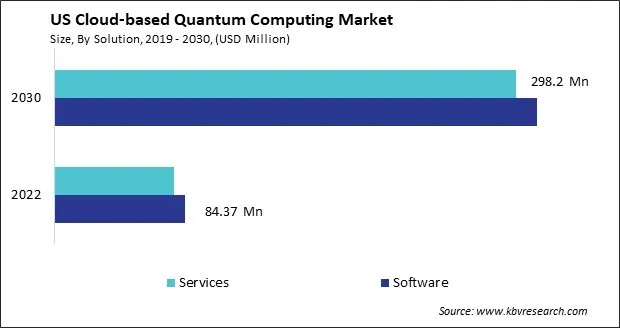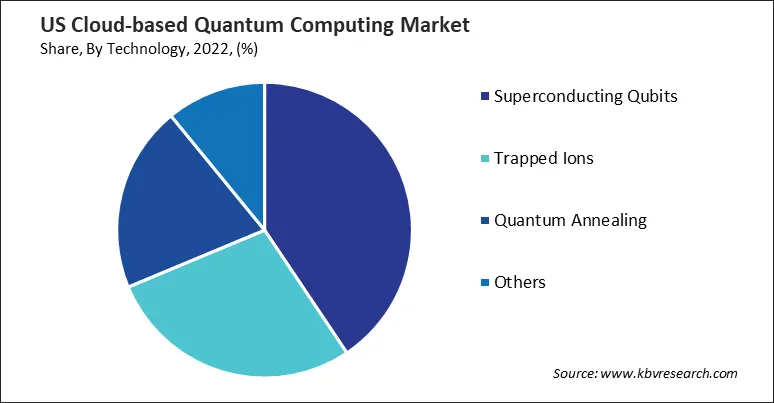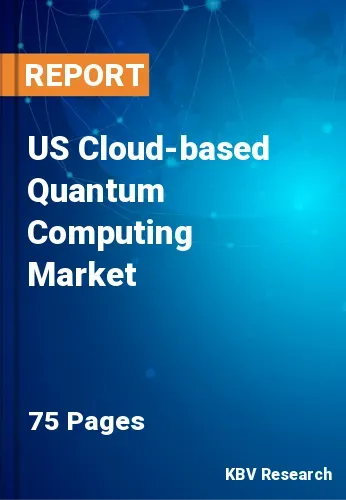The US Cloud-based Quantum Computing Market size is expected to reach $610.20 Million by 2030, rising at a market growth of 18.4% CAGR during the forecast period.
The cloud-based quantum computing market in the United States has witnessed significant growth in recent years. One of the key drivers propelling the growth of the cloud-based quantum computing market in the U.S. is the rising demand for more powerful computational capabilities. Traditional computers must improve the processing of massive amounts of data and solve complex optimization problems efficiently. Quantum computers leverage the principles of quantum mechanics to perform computations at a scale and speed that surpass classical computers.

Moreover, the accessibility offered by cloud-based quantum computing market has democratized access to quantum resources for researchers, developers, and businesses of all sizes. Cloud providers offer quantum computing services through their platforms, allowing users to remotely access quantum processors, simulators, and development tools. According to the Federal Trade Commission, cloud computing is a central part of the economy, with companies projected to spend $576 billion on cloud computing in 2023 in the U.S. This accessibility has lowered the barrier to entry for experimenting with quantum algorithms and applications, spurring innovation and collaboration across various industries.
Furthermore, cloud-based quantum computing platforms enable experimentation and innovation without significant upfront investment. Researchers, startups, and enterprises access quantum computing resources on a pay-per-use or subscription basis, reducing the financial risk of exploring quantum algorithms and applications. This accessibility fosters a vibrant ecosystem of innovation.
However, the COVID-19 pandemic has also impacted the cloud-based quantum computing market in the U.S. While the pandemic initially disrupted supply chains and slowed down some research activities, it highlighted the importance of advanced computing technologies in addressing global challenges. The need for accelerated drug discovery, vaccine development, and complex simulations to understand the virus's spread has underscored the importance of quantum computing in solving critical problems efficiently.

The automotive industry in the United States is experiencing a significant shift towards adopting cloud-based quantum computing technologies. One of the primary drivers behind the rising adoption of cloud-based quantum computing in the automotive industry is the ever-increasing demand for innovation and efficiency. According to Select USA, international automakers produced 5 million vehicles in the United States in 2020. As U.S. automakers strive to stay ahead in the competitive industry, they are turning to advanced technologies to enhance their product development processes.
Moreover, cloud-based quantum computing platforms provide automakers with access to vast computational resources without significant upfront investments in hardware infrastructure. This scalability and flexibility allow automotive companies of all sizes to leverage the power of quantum computing for tasks such as materials science research, aerodynamics analysis, and predictive maintenance, thereby accelerating innovation cycles. By leveraging quantum algorithms for optimization and risk analysis, U.S. manufacturers enhance inventory management, streamline logistics, and mitigate disruptions, ultimately leading to cost savings and improved operational efficiency.
Furthermore, pursuing autonomous driving technology presents another compelling use case for cloud-based quantum computing in the automotive sector. Quantum algorithms process vast amounts of data in real time, enabling autonomous vehicles to make split-second decisions with unprecedented accuracy and reliability. Thus, the automotive industry in the United States is embracing cloud-based quantum computing to drive innovation, efficiency, and advancement in product development, operations, and autonomous driving technology.
The demand for trapped ions in cloud-based quantum computing has steadily risen in the United States. One of the key drivers behind the increasing demand is the growing recognition of the transformative power of quantum computing. Industries ranging from finance and pharmaceuticals to cybersecurity and logistics are exploring quantum computing solutions to tackle complex optimization problems, simulate molecular structures, and enhance encryption protocols. As a result, there is a pressing need for more powerful and accessible quantum computing resources in the U.S., driving the demand for trapped ion-based systems.
Furthermore, trapped ions exhibit properties that make them well-suited for cloud-based quantum computing platforms. Their long coherence times enable the execution of complex quantum algorithms with minimal error rates, which is essential for achieving practical quantum advantage. The emergence of cloud-based quantum computing services in the U.S. has democratized access to quantum resources, allowing researchers, businesses, and developers to harness the power of quantum computing without the need for substantial upfront investments in hardware and infrastructure.
In addition to demand from commercial entities, government agencies and academic institutions in the U.S. are also driving the adoption of trapped ions in cloud-based quantum computing. Research initiatives aimed at advancing quantum computing capabilities and exploring potential applications are fueling the demand for accessible quantum resources, further accelerating the growth of the industry. Hence, the convergence of increasing demand from diverse industries, alongside the democratization of quantum resources through cloud-based platforms, is propelling the adoption of trapped ions in quantum computing across the United States.

The cloud-based quantum computing market in the United States is a burgeoning sector characterized by intense innovation and competition among companies striving to harness the potential of quantum technology. One prominent player in the cloud-based quantum computing market is IBM, a multinational technology company known for its advancements in quantum computing. IBM offers its quantum computing capabilities through the IBM Quantum Experience platform, which provides cloud-based access to quantum processors and simulators. With a growing ecosystem of users, developers, and partners, IBM is at the forefront of driving quantum research and applications through its cloud-based offerings.
Another key player is Google, which has made significant strides in quantum computing through its Quantum AI division. Google's quantum computing efforts are centered around its Quantum Computing Service, which aims to deliver accessible and scalable quantum computing resources via the cloud. With breakthroughs such as achieving quantum supremacy with its Sycamore processor, Google continues to push the boundaries of what's possible in quantum computing.
Microsoft is also a major player in the U.S. cloud-based quantum computing market with its Azure Quantum platform. Azure Quantum provides developers and researchers access to quantum hardware, software, and solutions through Microsoft's cloud infrastructure. By integrating quantum computing with classical computing resources, Microsoft aims to empower organizations to tackle complex problems more efficiently and effectively.
In addition to these tech giants, startups like Rigetti Computing are making significant contributions to the U.S. quantum computing landscape. Rigetti offers cloud-based access to its quantum processors and development tools through its Quantum Cloud Services platform. With a focus on quantum hardware and software development, Rigetti is driving innovation in quantum computing and collaborating with partners across industries to explore new applications.
D-Wave Systems, another notable player, specializes in quantum annealing technology and offers cloud-based access to its quantum processing units (QPUs) through the Leap quantum cloud service. The company's quantum annealing approach is well-suited for optimization and machine learning tasks, attracting customers from various sectors seeking to leverage quantum computing for real-world applications.
Other companies, such as IonQ and Xanadu, are also making waves in the cloud-based U.S. quantum computing market with their unique approaches to quantum hardware and software development. IonQ focuses on trapped-ion quantum computing and offers cloud-based access to its quantum processors through partnerships with leading cloud providers. Xanadu, on the other hand, specializes in photonic quantum computing and provides access to its quantum photonic processors via the cloud. As quantum computing continues to mature, fueled by advancements in hardware, software, and algorithms, the potential for transformative impact across industries is vast, making it an exciting time for stakeholders in the quantum computing ecosystem.
By Solution
By Technology
By Application
By Vertical
Our team of dedicated experts can provide you with attractive expansion opportunities for your business.

